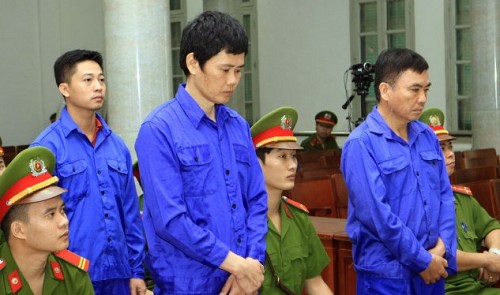Vietnam jails 6 railway officials for 52 years in Japanese-bribery scandal

The six, who all previously kept executive positions at the Railway Project Management Unit (RPMU) under the state-run Vietnam Railways, started going on trial on Monday on charges of “abusing powers while performing official duties.”
They include three former RPMU directors, namely Tran Quoc Dong, Tran Van Luc, and Nguyen Van Hieu; two former deputy directors, Pham Hai Bang and Pham Quang Duy; and Nguyen Nam Thai, former head of a project implementation office under the unit.
In 2008, the Vietnam Railways appointed the RPMU as the developer of the urban railway No.1 project in Hanoi, and signed a technical consultancy contract with a joint venture led by the Japan Transportation Consultants (JTC) one year later.
The ¥4.2 billion (US$34.76 million) project is partly funded by official development assistance (ODA) loans granted by the Japanese government.
Prosecutors said Bang, the then-RPMU deputy director, had repeatedly demanded some “supporting fees” from JTC, and the Japanese firm eventually gave him VND11 billion ($491,071) between 2009 and 2014.
Bang admitted in court to having received such an amount of money from JTC and spent VND4.8 billion ($214,286) of the sum on various purposes, such as organizing meetings, vacations and contract-signing ceremonies, as well as giving bonuses to employees.
Thai also confessed to having spent VND3.4 billion ($151,786) of the kickback paid by JTC, whereas Hieu said that he did know of the acceptance and use of the bribe by Bang and Thai but did not stop them from doing so.
In the meantime, Duy also received his share from the JTC money three times, while Dong and Luc also took no action after learning of the kickback.
Such confessions are similar to those made by the Japanese officials involved and match other evidence, providing enough grounds to rule that Bang and the other five officials reached an agreement with JTC on the VND11 billion bribe, the court said.
The longest jail term, 12 years, was handed down on Bang, whereas Thai got 11 years.
The respective verdicts for Duy and Luc were 8.5 years and 5.5 years, while Dong and Hieu were both sentenced to 7.5 years behind bars.
The former officials were also requested to return the VND11 billion they received from the Japanese company to add to the state budget, according to the court's decision.
The court also demanded they pay an additional fine of VND30 million ($1,339) each, and banned them from taking any official position for three years after their jail terms end.
The Ministry of Transport and Vietnam Railways had also been summoned to attend the court but they did not show up.
The court thus suggested that regulatory bodies launch a probe to see if any individuals working at these two entities had committed wrongdoings linked to the graft scandal of the six former RPMU officials.
In February this year, three former JTC executives were also tried by a Tokyo court, which found all of them guilty of active bribery charges, according to court documents provided by global legal practice Norton Rose Fulbright.
Former JTC chairman Tamio Kakinuma received a two-year sentence (suspended for three years), whereas former managing director Tatsuro Wada got a three-year conviction (suspended for four years).
Former director Koji Ikeda was subject to a 2.5-year sentence (suspended for three years).
What the stars mean:
★ Poor ★ ★ Promising ★★★ Good ★★★★ Very good ★★★★★ Exceptional
Latest News
More News
- 14th National Party Congress wraps up with success (January 25, 2026 | 09:49)
- Congratulations from VFF Central Committee's int’l partners to 14th National Party Congress (January 25, 2026 | 09:46)
- List of newly-elected members of 14th Political Bureau announced (January 23, 2026 | 16:27)
- 14th Party Central Committee unanimously elects To Lam as General Secretary (January 23, 2026 | 16:22)
- List of members of 14th Party Central Committee announced (January 23, 2026 | 09:12)
- Highlights of fourth working day of 14th National Party Congress (January 23, 2026 | 09:06)
- Press provides timely, accurate coverage of 14th National Party Congress (January 22, 2026 | 09:49)
- Press release on second working day of 14th National Party Congress (January 22, 2026 | 09:19)
- Minister sets out key directions to promote intrinsic strength of Vietnamese culture (January 22, 2026 | 09:16)
- 14th National Party Congress: Renewed momentum for OVs to contribute to homeland (January 21, 2026 | 09:49)
















 Mobile Version
Mobile Version